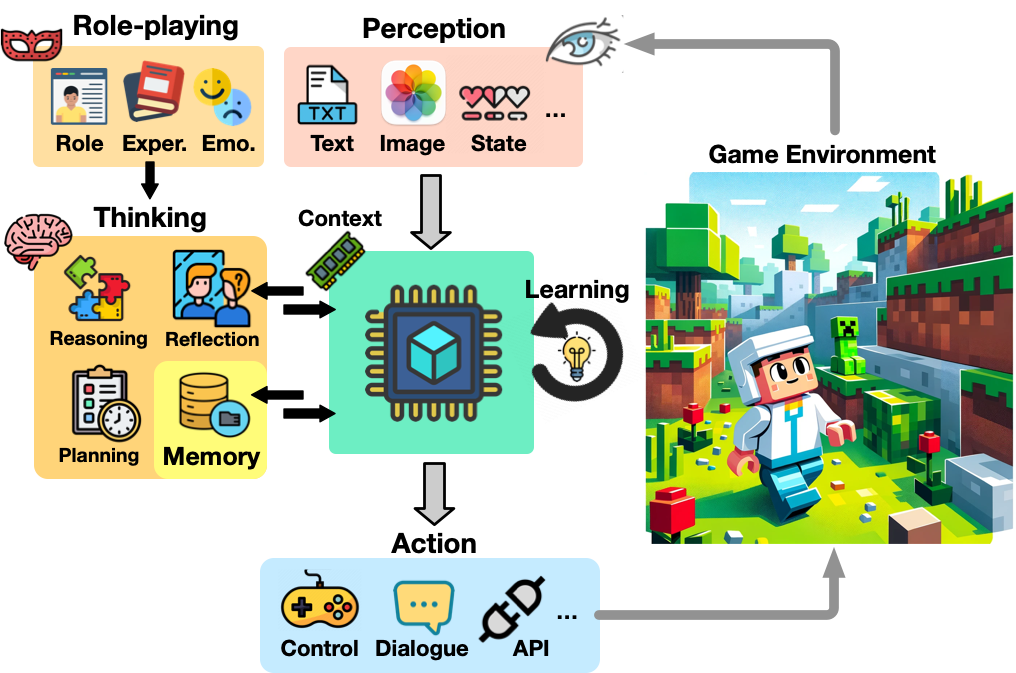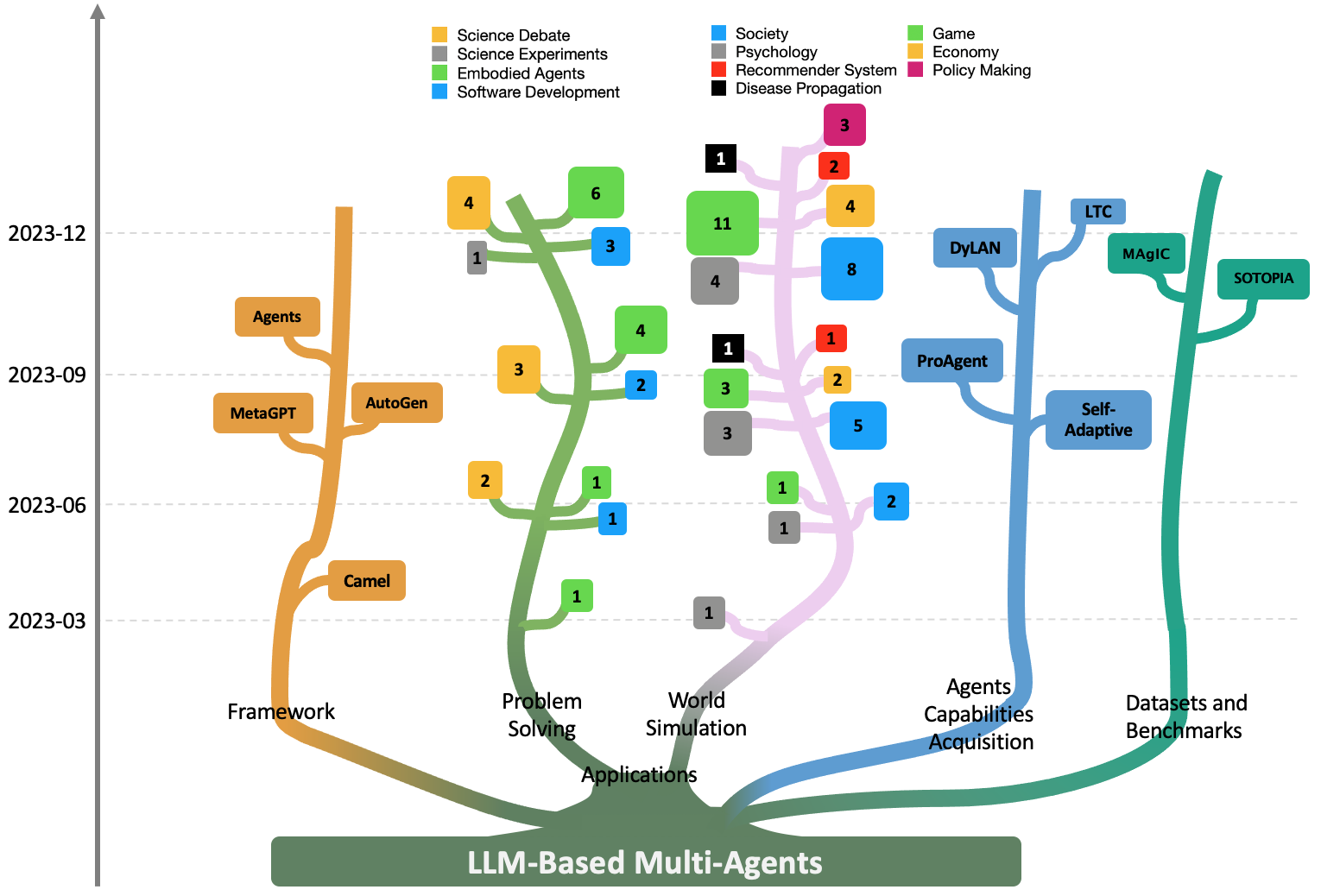AgentGym: Evolving Large Language Model-based Agents across Diverse Environments
2406.04151

0
0

Abstract
Building generalist agents that can handle diverse tasks and evolve themselves across different environments is a long-term goal in the AI community. Large language models (LLMs) are considered a promising foundation to build such agents due to their generalized capabilities. Current approaches either have LLM-based agents imitate expert-provided trajectories step-by-step, requiring human supervision, which is hard to scale and limits environmental exploration; or they let agents explore and learn in isolated environments, resulting in specialist agents with limited generalization. In this paper, we take the first step towards building generally-capable LLM-based agents with self-evolution ability. We identify a trinity of ingredients: 1) diverse environments for agent exploration and learning, 2) a trajectory set to equip agents with basic capabilities and prior knowledge, and 3) an effective and scalable evolution method. We propose AgentGym, a new framework featuring a variety of environments and tasks for broad, real-time, uni-format, and concurrent agent exploration. AgentGym also includes a database with expanded instructions, a benchmark suite, and high-quality trajectories across environments. Next, we propose a novel method, AgentEvol, to investigate the potential of agent self-evolution beyond previously seen data across tasks and environments. Experimental results show that the evolved agents can achieve results comparable to SOTA models. We release the AgentGym suite, including the platform, dataset, benchmark, checkpoints, and algorithm implementations. The AgentGym suite is available on https://github.com/WooooDyy/AgentGym.
Create account to get full access
Overview
- This paper introduces AgentGym, a framework for evolving large language model-based agents across diverse environments.
- The researchers demonstrate how large language models can be used to create powerful and versatile agents that can excel in a wide range of tasks and environments.
- The paper covers the key technical details of the AgentGym framework, as well as the results of experiments showcasing the capabilities of the agents it produces.
Plain English Explanation
The researchers have created a new system called AgentGym that can take a large language model, like the ones used for tasks like natural language processing, and train it to become a highly capable agent that can perform well in a wide variety of different environments and tasks.
Large language models are powerful AI systems that have been trained on massive amounts of text data, allowing them to understand and generate human-like language. The researchers discovered a way to take these language models and further train them to become agents - AI systems that can take actions and make decisions in interactive environments, like video games or robotic simulations.
By evolving these language model-based agents across many different environments, the researchers were able to create agents that are extremely versatile and successful at a diverse range of tasks. The paper provides the technical details of how they achieved this, as well as the impressive results of their experiments demonstrating the capabilities of these evolved agents.
This research is significant because it shows how the powerful language understanding capabilities of large language models can be leveraged to create highly capable and adaptable agents that can thrive in complex, dynamic environments. This could have important applications in areas like robotics, game AI, and other domains where flexible, intelligent agents are needed.
Technical Explanation
The core of the AgentGym framework is the idea of evolving large language model-based agents across a diverse set of environments. The researchers take a pre-trained language model, such as GPT-3, and fine-tune it through reinforcement learning to perform well in a specific task or environment.
They then expose this agent to a wide variety of other environments, allowing it to continuously improve and adapt its capabilities. This evolutionary process leads to agents that are able to excel across many different domains, from classic video games to robotic control tasks.
The key technical innovations in AgentGym include:
- Environment Diversity: The researchers curate a suite of diverse environments, ranging from simple gridworlds to complex 3D simulations, to train and evaluate the agents.
- Language Model Integration: They develop methods to seamlessly integrate the large language model into the agent architecture, allowing it to leverage its powerful language understanding capabilities.
- Evolutionary Training: The agents undergo a multi-stage training process, first learning basic skills, then iteratively improving through exposure to new environments.
Through extensive experiments, the researchers demonstrate that the AgentGym agents are able to significantly outperform traditional RL agents and even match the performance of specialized agents trained on individual tasks. This highlights the remarkable flexibility and capability of these language model-based agents.
Critical Analysis
One potential limitation of the AgentGym approach is the computational resources required to train these large, evolving agents. The researchers note that the training process can be time-consuming and resource-intensive, which may limit the practical applicability of the framework, especially for smaller research teams or organizations.
Additionally, the paper does not delve deeply into the interpretability or explainability of the evolved agents. As these agents become increasingly complex, it may become challenging to understand the reasoning behind their decisions and actions, which could be a concern in safety-critical applications.
Further research could also explore the extent to which the agents' capabilities generalize beyond the specific environments used in the experiments. It would be valuable to test the agents in truly novel and unexpected situations to better understand the limits of their adaptability and robustness.
Overall, the AgentGym framework represents an exciting advance in the field of large language model-based agents, demonstrating their remarkable potential for versatility and performance. However, as with any powerful AI technology, it will be important to carefully consider the potential risks and limitations as this research progresses.
Conclusion
The AgentGym paper presents a novel framework for evolving large language model-based agents that can excel across a diverse range of environments. By leveraging the powerful language understanding capabilities of these models and training them through an iterative, evolutionary process, the researchers have created highly capable and adaptable agents.
The technical details and experimental results showcased in the paper are impressive, highlighting the potential of this approach to transform fields like robotics, game AI, and other domains that require flexible, intelligent agents. While there are some potential limitations and areas for further research, the AgentGym framework represents an important step forward in the development of advanced, language-based AI systems.
As the field of large language model-based agents continues to evolve, the insights and innovations presented in this paper will undoubtedly inspire further advancements and applications, with far-reaching implications for both the research community and society as a whole.
This summary was produced with help from an AI and may contain inaccuracies - check out the links to read the original source documents!
Related Papers

A Survey on Large Language Model-Based Game Agents
Sihao Hu, Tiansheng Huang, Fatih Ilhan, Selim Tekin, Gaowen Liu, Ramana Kompella, Ling Liu

0
0
The development of game agents holds a critical role in advancing towards Artificial General Intelligence (AGI). The progress of LLMs and their multimodal counterparts (MLLMs) offers an unprecedented opportunity to evolve and empower game agents with human-like decision-making capabilities in complex computer game environments. This paper provides a comprehensive overview of LLM-based game agents from a holistic viewpoint. First, we introduce the conceptual architecture of LLM-based game agents, centered around six essential functional components: perception, memory, thinking, role-playing, action, and learning. Second, we survey existing representative LLM-based game agents documented in the literature with respect to methodologies and adaptation agility across six genres of games, including adventure, communication, competition, cooperation, simulation, and crafting & exploration games. Finally, we present an outlook of future research and development directions in this burgeoning field. A curated list of relevant papers is maintained and made accessible at: https://github.com/git-disl/awesome-LLM-game-agent-papers.
4/3/2024

LLM-POET: Evolving Complex Environments using Large Language Models
Fuma Aki, Riku Ikeda, Takumi Saito, Ciaran Regan, Mizuki Oka

0
0
Creating systems capable of generating virtually infinite variations of complex and novel behaviour without predetermined goals or limits is a major challenge in the field of AI. This challenge has been addressed through the development of several open-ended algorithms that can continuously generate new and diverse behaviours, such as the POET and Enhanced-POET algorithms for co-evolving environments and agent behaviour. One of the challenges with existing methods however, is that they struggle to continuously generate complex environments. In this work, we propose LLM-POET, a modification of the POET algorithm where the environment is both created and mutated using a Large Language Model (LLM). By fine-tuning a LLM with text representations of Evolution Gym environments and captions that describe the environment, we were able to generate complex and diverse environments using natural language. We found that not only could the LLM produce a diverse range of environments, but compared to the CPPNs used in Enhanced-POET for environment generation, the LLM allowed for a 34% increase in the performance gain of co-evolution. This increased performance suggests that the agents were able to learn a more diverse set of skills by training on more complex environments.
6/10/2024
🛸
EvoAgent: Towards Automatic Multi-Agent Generation via Evolutionary Algorithms
Siyu Yuan, Kaitao Song, Jiangjie Chen, Xu Tan, Dongsheng Li, Deqing Yang

0
0
The rise of powerful large language models (LLMs) has spurred a new trend in building LLM-based autonomous agents for solving complex tasks, especially multi-agent systems. Despite the remarkable progress, we notice that existing works are heavily dependent on human-designed frameworks, which greatly limits the functional scope and scalability of agent systems. How to automatically extend the specialized agent to multi-agent systems to improve task-solving capability still remains a significant challenge. In this paper, we introduce EvoAgent, a generic method to automatically extend expert agents to multi-agent systems via the evolutionary algorithm, thereby improving the effectiveness of LLM-based agents in solving tasks. Specifically, we consider the existing agent frameworks as the initial individual and then apply a series of evolutionary operators (e.g., mutation, crossover, selection, etc.) to generate multiple agents with diverse agent settings. EvoAgent can be generalized to any LLM-based agent framework, and can automatically extend the existing agent framework to multi-agent systems without any extra human designs. Experimental results across various tasks have shown that EvoAgent can automatically generate multiple expert agents and significantly enhance the task-solving capabilities of LLM-based agents.
6/21/2024

Large Language Model based Multi-Agents: A Survey of Progress and Challenges
Taicheng Guo, Xiuying Chen, Yaqi Wang, Ruidi Chang, Shichao Pei, Nitesh V. Chawla, Olaf Wiest, Xiangliang Zhang

0
0
Large Language Models (LLMs) have achieved remarkable success across a wide array of tasks. Due to the impressive planning and reasoning abilities of LLMs, they have been used as autonomous agents to do many tasks automatically. Recently, based on the development of using one LLM as a single planning or decision-making agent, LLM-based multi-agent systems have achieved considerable progress in complex problem-solving and world simulation. To provide the community with an overview of this dynamic field, we present this survey to offer an in-depth discussion on the essential aspects of multi-agent systems based on LLMs, as well as the challenges. Our goal is for readers to gain substantial insights on the following questions: What domains and environments do LLM-based multi-agents simulate? How are these agents profiled and how do they communicate? What mechanisms contribute to the growth of agents' capacities? For those interested in delving into this field of study, we also summarize the commonly used datasets or benchmarks for them to have convenient access. To keep researchers updated on the latest studies, we maintain an open-source GitHub repository, dedicated to outlining the research on LLM-based multi-agent systems.
4/22/2024